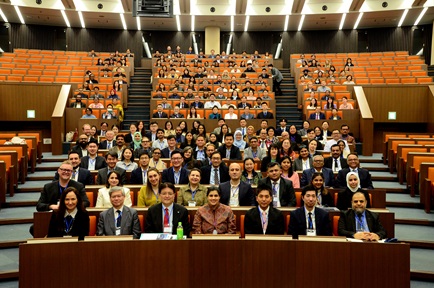Why talking to strangers is a skill we can’t afford to lose
In an era dominated by screens, face-to-face conversations are becoming increasingly rare. It’s time to step out of our comfort zones.
I gave my Singaporean students a new assignment recently: Come up with ideas for a new bubble tea shop on campus. But there was a catch. They had to walk around campus, talk to strangers, and come back with insights about what people their age think about bubble tea. To my surprise, many students didn't rush out to do this timed exercise.
Instead, they opened their laptops and started making PowerPoint slides. I had to gently nudge them towards the exit and encourage them to talk to strangers.
Admittedly, the Covid-19 pandemic severely limited my students' face-to-face interactions, and its effects are still being felt today. A recent survey by the Institute of Policy Studies at NUS found that more than half of Singaporeans and permanent residents aged 21 to 34 sometimes feel anxious about face-to-face interactions. In contrast, only about a third of respondents aged 50 and above feel the same.
Younger generations are spending less time socialising in person and more time communicating online. In the US, for example, research has shown that teenagers spend much less time communicating face-to-face with their friends than previous generations. In the late 1970s, 52 per cent of high school seniors met up with friends almost every day. By 2017, that percentage had dropped to 28 per cent. This decline in face-to-face meetings accelerated after 2010 and coincided with the increasing use of smartphones and social media.
In a world of cellphones and social media, opportunities to talk to strangers face to face are becoming scarce. A recent survey found that teenagers in Singapore spend almost 8.5 hours a day in front of screens. No surprise, then, that my students, like many young people, struggle to engage with strangers offline. With digital interactions becoming the norm, face-to-face interactions have become daunting.
While there are great programmes springing up to get people talking, there is still much to be done to develop these skills. Communication courses in Singapore universities are usually about structured interactions, such as giving a presentation or writing a memo. But classroom exercises do not always translate to social confidence outside of school, and for many students, face-to-face communication remains difficult.
In her TED Talk "Connected But Alone?", sociologist Sherry Turkle tells the story of an 18-year-old boy who communicates almost exclusively via text and admitted to her: "One day, I'd like to learn how to have a conversation." Yet, learning to converse with complete strangers could be one of the best investments in themselves that a young person can make.
Informal ties -- such as acquaintances and casual connections -- are crucial to a person's career. This is because strong ties -- close friends and family -- usually involve the parties knowing same things as you do. In contrast, informal ties broaden your horizons by opening you up to new ideas and opportunities.
People skills in the age of AI
The advent of artificial intelligence (AI) means that people skills such as being able to talk to strangers will become even more important. Take finance, a critical sector for Singapore's economy. Even as AI automates tasks and replaces jobs, banks and other financial firms are placing even more emphasis on the relational skills of their new recruits.
A LinkedIn Global Talent Trends report found that 92 per cent of talent acquisition managers consider soft skills to be as important, if not more important, than hard skills. Eighty-nine per cent of them believe that a lack of critical soft skills is the main reason for new hire failures.
Good for your mental health
Talking to strangers also increases your happiness. In a well-known experiment, psychology professor Gillian Sandstrom had participants use two clickers. They activated a red clicker for conversations with close friends and family, and a black one for short conversations with acquaintances and strangers.
At the end of each day, the participants who clicked more often with the black clicker -- meaning they had more interactions with more informal ties -- also felt happier and more energised.
Other studies on conversations with strangers have come to the same conclusion: you may feel uncomfortable about starting them at first, but casual conversations with strangers can improve your happiness, sense of connection and self-confidence.
Countering loneliness
Talking to strangers can also be an important way of combating loneliness. In a 2024 survey by CNA's Talking Point programme, 60 per cent of young people said they felt lonely. In a global study of people under 29, more than 25 per cent reported feeling "very lonely" or "quite lonely".
With the increase in screen time, loneliness among young people will only get worse. However, most government programmes to combat loneliness tend to focus on seniors rather than young people. In Singapore, for example, efforts have long focused on befriending services and community networks for the elderly. It is only recently that the impact of loneliness and mental health issues among young people has been increasingly recognised, leading to a shift towards youth-oriented support programmes.
Fortunately, many people are realising the benefits of talking to strangers. In the UK, there's an initiative called Chatty Cafe. It encourages cafes to set aside special tables for customers who want to chat with others. Over 96 per cent of participants reported they feel less lonely, and 750 cafes in the UK are now offering the service.
Efforts to tackle isolation are also growing in Singapore. Offline Singapore, founded in 2022, hosts curated social gatherings where participants engage in icebreaker games and conversations without discussing work for the first 90 minutes. Friendzone organises neighbourhood-based meet-ups. And Human Library SG events, an initiative which began in Denmark, involves participants "borrowing" human books: real people with unique stories. Recent meet-ups have included a former prisoner, a refugee, an anti-death penalty activist and a stay-at-home dad. These "human books" help trigger conversations and challenge stereotypes through dialogue.
Talking to strangers is like a muscle -- if we don't exercise it, it remains undeveloped. So we need more training for young people to learn to talk to anyone, anywhere. Universities should start teaching improvisation theatre skills. And instead of the stark "stranger/danger" warnings of the past, schools could develop a more nuanced message, helping kids differentiate between risky situations and the value of safe, everyday social interactions.
Businesses have a crucial role to play in fostering social connections through what my colleague Bernard Cova calls "linking value" -- the ability of products or services to bring people together. While many young consumers already engage with brands through online communities, in-person interactions create deeper, more memorable experiences.
A strong example of this in Singapore is the Canon Photo Marathon, which has brought photography enthusiasts together since 2003. Globally, companies including Harley-Davidson and Lego have also successfully embedded social belonging into their brand, demonstrating that while online engagement is valuable, offline interactions are especially powerful in creating brand value.
But there is still a lot of potential in this space because increasingly more people worldwide are searching for ways to connect, share experiences and combat isolation. As the success of initiatives like Offline Singapore or Chatty Cafe show, there is plenty of demand for businesses to facilitate interactions. Even as we spend more time in front of screens, the desire for genuine human connection remains strong.
As a foreigner in Singapore, talking to strangers has not always been easy. In my condominium, I often struggle to make eye contact, as many people tend to keep to themselves. While Singapore is known for its efficiency and order, it is probably not the best place in the world for casual social interactions. It often strikes me as odd, for instance, that while Grab has the option to have a "quiet ride", there are no options to say "I would love to chat".
In Alaska, an Uber driver gained social media attention for offering passengers a "conversation menu", letting them customise their ride experience. The menu had options such as a joke-filled trip, an informative ride or even a "rude" ride for those who enjoy playful banter.
There are times when I simply want to be left alone during my rides. But I'd also love to find a hairdresser who enjoys discussing books, a barista who chats about world news and a taxi driver who could teach me more Singlish.
Next semester, I will try the same exercise again. I will ask my students to step out of their comfort zone and talk to strangers. But maybe I'll take more time to explain the importance of this powerful muscle, both for their careers and for their well-being.
Julien Cayla is an associate professor at Nanyang Business School, Nanyang Technological University.
Source: The Straits Times







